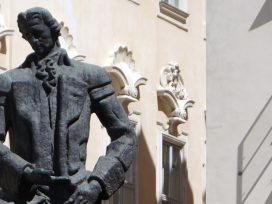Some days I feel like there must be two parallel worlds: the one I live in (together with my colleagues, family, friends, and the people I work with in the ghettos of Bucharest), and another which is almost the same, but somehow perplexingly different.
In my world we have successes and failures, but most days are a mix of the two: good things and bad things happen, many of them beyond our control. We do our best to cope and to help the people around us. We talk to people in order to communicate, to share information, and to understand what others are experiencing and what they need.
You know that you’ve entered the parallel world due to the presence of a few telltale signs. Firstly, the actions of the “elites” are always good. The language spoken is another give-away: certain words and phrases seem to have rather unconventional meanings. You might also notice the almost complete absence of ethnic and religious minorities (or “darker people” in the ordinary language of my world).
Let’s call this parallel world “Euro-Narnia”. In Euro-Narnia we always see “significant progress”. Euro-Narnia is accessible through special doors in Brussels, and in capital cities where governments sit. Practices initiated by Euro-Narnians are always “positive” and there have been many “leaps forward” when it comes to the social inclusion of Roma (quotations courtesy of the holy reports of the Roma Ministry of Euro-Narnia).
As I mentioned, one of the special features of Euro-Narnia is the language spoken there. Let’s take a closer look.
 The workings of Euro-Narnia are based, among other things, on Respect for the Human Rights of Roma. Now, Respect is not a code of law handed down by a talking lion (in fact there are no lions in Euro-Narnia, even if we call its mighty ruler “Baroslan”). In fact, the meaning of the word Respect in Euro-Narnian is difficult to fathom. When it comes to Roma, the governing institutions of Euro-Narnia exhibit (and here I use another Euro-Narnian phrase) the worst symptoms of “structural racism”. In our language: you are not likely to spot a Roma person in any important job in Euro-Narnia. Respect seems to mean that Euro-Narnians love Roma as long as they are only visiting (preferably briefly), and as long as they praise the Royals and Seniors (blessed by Baroslan be their names) leading the Euro-Narnian institutions. Euro-Narnians do not trust us, and decisions about how to “fix” us are placed in the hands of those untainted by direct contact with our realities, under the wise guidance of the mighty Queen.
The workings of Euro-Narnia are based, among other things, on Respect for the Human Rights of Roma. Now, Respect is not a code of law handed down by a talking lion (in fact there are no lions in Euro-Narnia, even if we call its mighty ruler “Baroslan”). In fact, the meaning of the word Respect in Euro-Narnian is difficult to fathom. When it comes to Roma, the governing institutions of Euro-Narnia exhibit (and here I use another Euro-Narnian phrase) the worst symptoms of “structural racism”. In our language: you are not likely to spot a Roma person in any important job in Euro-Narnia. Respect seems to mean that Euro-Narnians love Roma as long as they are only visiting (preferably briefly), and as long as they praise the Royals and Seniors (blessed by Baroslan be their names) leading the Euro-Narnian institutions. Euro-Narnians do not trust us, and decisions about how to “fix” us are placed in the hands of those untainted by direct contact with our realities, under the wise guidance of the mighty Queen.
I know this seems difficult to understand. Maybe an example will help. The Euro-Narnian Ministry for Roma organized a huge event on Roma this year, which they the “The Extraordinary European Platform on Roma Inclusion”. The Queen honoured us ordinary folk (you can call us peasants, if you wish) by breathing the same air as us for almost five minutes after her speech. She spoke in Euro-Narnian: we peasants didn’t understand much. She maintained her usual dignified and imperial pose, and certainly didn’t get involved in any discussion with the audience.
However, the Queen and her Ministry exercised Respect by inviting two Roma peasants as speakers (out of twenty-nine). One of us even stood next to the Queen. The Euro-Narnians made sure that both peasants had spent enough time in Euro-Narnia and spoke good Euro-Narnian, in order not to scare away any High-Level Euro-Narnians or Royals who might have wandered into the building during the event by mistake. Both peasants were polite and used the compulsory Euro-Narnian almost fluently (“Mainstreaming Roma intersectionality”; “multistakeholder’s positive practices”; “better flexicurity within the framework of the flagship initiative 2020”).
The Respect thing is mentioned relentlessly by the Euro-Narnians. I’m beginning to suspect that they believe it will protect them from the Gypsy evil eye. It seems to work: it keeps us Roma away most of the year. (Note to myself: I should try it with some of my relatives.)
Another puzzling word is Experience. Let’s start with a quotation from the Euro-Narnian holy book: “Very experienced people work in the Ministry for the Social Inclusion of Roma.”
The experience of the senior and middle-management level Euro-Narnians in question is drawn mainly from rare, well-chosen and protected visits to Roma neighbourhoods, talking to carefully chosen Roma peasants, participating in Roma conferences (where one might find Roma) and reading some (not too many) books about Roma. So you see, they are courageous as well as experienced! Any significant hands-on or academic experience in the field of Roma might taint their superior thinking and judgment. In order to maintain her perfectly unbiased position, the Queen herself has never visited the places where most of us live. According to rumour, she does not read her speeches before delivering them, and she forgets them immediately afterwards.
Now, I often talk to surgeons and my mother worked in an emergency room (cleaning it). I’ve visited hospitals (a lot more often than the brave Euro-Narnians visit Roma neighbourhoods). I watch Gray’s Anatomy and MASH religiously (both are TV series about doctors) and from time to time I read books that allude to surgery. I’ll now share my secret hope: I thought perhaps that all this Experience could make me a surgeon, if not the King of Surgeons, in Euro-Narnia. It didn’t work at all. Therefore, I can only conclude that the meaning of the word Experience in Euro-Narnian is evasive, and requires further scrutiny.
But enough about language. The way Euro-Narnians at the Roma Ministry seek to effect our social inclusion is also rather intriguing. In the first place, they are sure to listen to nobody but their own people with regard to what should be done. Another important, compulsory step in the social inclusion of Roma is to hold regular meetings and events at four and five-star Euro-Narnian hotels.
In fact, most of the money allocated to Roma social inclusion is spent on meetings in four- and five-star hotels, training sessions in the Euro-Narnian language, salaries for Euro-Narnians or Euro-Narnian experts, and producing papers that only Euro-Narnians can read. And only those papers that meet the criteria are read. That is, they must not disturb the wellbeing or the disposition of Euro-Narnians, so that the bright and always correct ideas that Euro-Narnians at the Roma Ministry have about Roma and the impact of Euro-Narnian actions remain sovereign.
And I haven’t even mentioned the per diems yet! As compensation for the inconvenience of attending meetings at four and five-star hotels, the Euro-Narnians receive hefty per diems. Sometimes the per diem for a two-day conference exceeds the average annual income for many of the excluded Roma. And the total costs for one of these meetings is on average much higher that the yearly budget of a medium-sized Roma village. But blessed be their souls and their leader: we know that they deserve ample compensation for the long working hours and severe hardship they endure. Lately the best of us Roma (still small in number, but certainly the cream of the crop) have started to follow the Euro-Narnian trend and are completely unable to meet anywhere aside from luxury hotels. Our meetings are still rather unsophisticated and our elite will still talk to any old peasant – but surely this state of affairs will improve with time. We are moving in the right direction.
It is virtually forbidden for Euro-Narnian money to be spent in a ghetto. Euro-Narnians in the Ministry are highly sensitive to unfiltered air and anything that might contaminate the purity of their thought and are understandably reluctant to enter ghettos. (Ghettos also tend to be inconveniently far away from four- and five-star hotels.)
Before closing, I should mention, by way of warning, that from time to time there are Euro-Narnians (even in the Roma Ministry) who run away from Euro-Narnia and are genuinely interested in talking to us and working with us to find solutions. You might say they have “gone native”. These people risk being stigmatized and labelled as “infected” by their colleagues. They are treated with well-deserved contempt and sometimes feared. Most are kept at arm’s length and become outcasts. Some of the Royals close to Baroslan (a German, a Czech and a Hungarian come to mind) were genuinely interested in us peasants, spoke a dialect we could understand, and spent time with us. I suspect this brought shame on the Euro-Narnian government. Two of them have since departed, and the third is thought to be “different”. Perhaps this is why Baroslan decided we needed an untainted and aloof Queen.
This is the first chapter in The Chronicles of Euro-Narnia to be published on Valeriu Nicolae’s blog.







